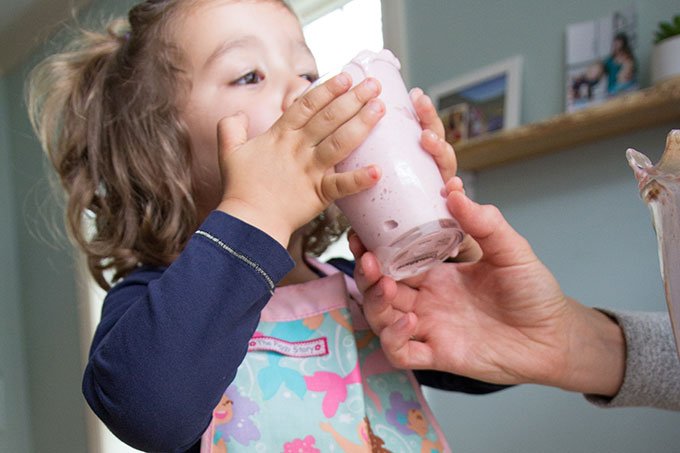Feeding little kids is a challenge, but it’s quite possible their eating habits and behavior are totally normal. Picky eating is actually a very typical developmental phase, so if you know what to expect, you can handle the ups and downs with grace and patience as you remember learning to eat is a very long process!
Picky Eating
Trust me, I’ve been there. There’s the refusal to eat a meal you’ve made. Not wanting to eat foods they loved yesterday. Changing their minds about the foods they want in the middle of a meal. Having no appetite one day, then eating everything in sight the next day.
It can make our heads spin. By nature, toddlers are very (very) fickle eaters. This normal nature of selective eating can be intensely frustrating and unpredictable, and it can make us feel like a moving target at the table. Plus, when you combine it with the love that our toddlers have for routine, the expected, and the known, it’s easy to find yourself in a situation where your 16-month-old only eats one very particular type of bread. Or your 3-year-old refuses everything except crackers and cheese for lunch.
Every single day.
Your toddler won’t eat? Help is here!
Sign up for our email updates to get tips and ideas sent to your inbox.
The Importance of Exposure
For kids to feel comfortable enough to try a food, the newness has to go away. “It doesn’t go away in 2 offerings or 5 offerings, and often not in 10. Kids need to see things consistently in different settings by different people. It’s normal that your child doesn’t try things in the beginning and that they reject them in the beginning. It’s a normal phase of development,” says feeding therapist Jenny Berry.
“We can expose kids to a wide variety of foods by eating it ourselves, by having them be involved in the preparation of it, by taking them to the grocery store. We can expose them to a lot of foods without putting that insane pressure on ourselves,” she says. Our job isn’t to dictate what goes into their mouths, even though most of us assume we need to do that.
The Five Internal Drives to Eat
When assessing how things are going with food and your child, Jenny recommends looking at all of the internal drives to eat—which includes more than just hunger. These five drives are the natural reasons to eat, and we need to learn all of them in childhood to be well-rounded, healthy eaters. They include:
- Hunger
- Togetherness
- Curiosity
- Novelty
- Comfort
If you can step back and keep those at the forefront of your mind, especially when you’re feeling conflicted about what to feed your family or yourself, it can help. If you’ve got one of those 5—like if your child is enjoying time with a sibling and food is involved—then one of the internal drives to eat is being met and you’re good.
“Health is about more than food. It’s about the whole child. Are they happy and participating in school? Are they affectionate and emotionally doing OK? Are they meeting milestones and progressing? Then we’re in a good spot and we don’t have to make it about the food all the time,” Jenny wisely explains. (Hear more of her advice on feeding kids in episode 53 of our Comfort Food podcast.)
TIP: Remember you want the kids to feel safe and comfortable around food for years to come, not just to eat a bite of broccoli today.
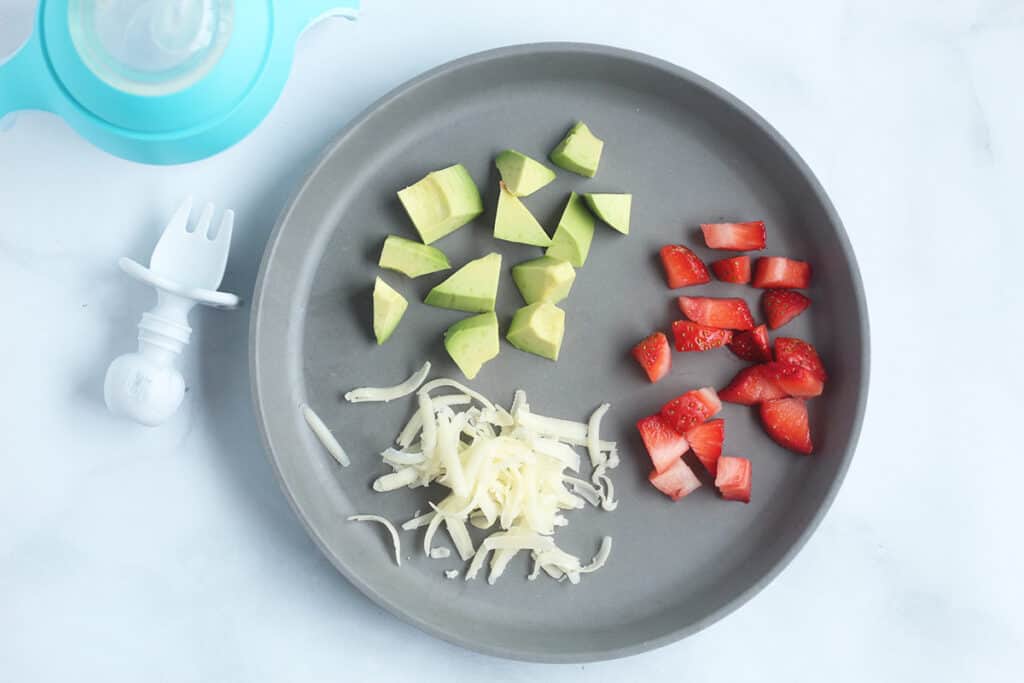
When Picky Eating Isn’t a Problem
Most kids go through a stage called neophobia between ages 2 and 6 where they are naturally more skeptical of new foods. (And “new foods” can mean foods they haven’t seen in a while and don’t remember.) If you can realize this is normal, expect them to bring this outlook to the table, and know this way of eating isn’t necessarily a problem in the long run, you’ll be much better equipped to handle your own feelings about what they may or may not be eating.
Here are a few examples of how this could play out and how you might want to handle them.
A Toddler Isn’t Hungry for Breakfast
At breakfast, you offer cut-up peaches, plain yogurt, and a little toast. Your toddler eats only the peaches and throws the rest onto the floor and smears the yogurt all over. You get frustrated because, well, such a mess! So disrespectful of your efforts!
Reality Check: It’s entirely possible your toddler isn’t a big breakfast person and simply wasn’t hungry for much more than fruit. You could try pushing breakfast back 20-30 minutes (if you have the time), drastically cutting back the amount of food you serve so your expectations for the amount they will actually eat are naturally lower, or even thinking of breakfast as a “snack” and the midmorning snack as “breakfast”. They may surprise you and eat a ton at 9 a.m. versus 7!
A Toddler Doesn’t Eat Much of a Food They Usually Like
One night at dinner, you serve up a big bowl of the pasta your toddler typically inhales. He eats some, but not as much as you expect, and skips the broccoli that’s on the side. Argh! Why isn’t he eating as much as he normally does? He loves this meal!
Reality Check: Maybe he’s tired or teething or he simply had a bigger or later afternoon snack than the last time you made this meal. Maybe the texture of the broccoli just wasn’t doing it for him today. Who knows!
If we try not to compare our toddler’s intake with previous meals and simply let it be what it is, we’ll be able to accept that they’re simply trusting their own hunger cues. Try not to push and don’t coerce bites—which often turns into a power struggle at that meal and meals going forward, and is no fun for anyone—because it’s really up to them to decide how hungry they are.
It’s VERY normal for hunger to fluctuate. And it’s very hard to accurately predict how hungry someone else might be at any given meal.
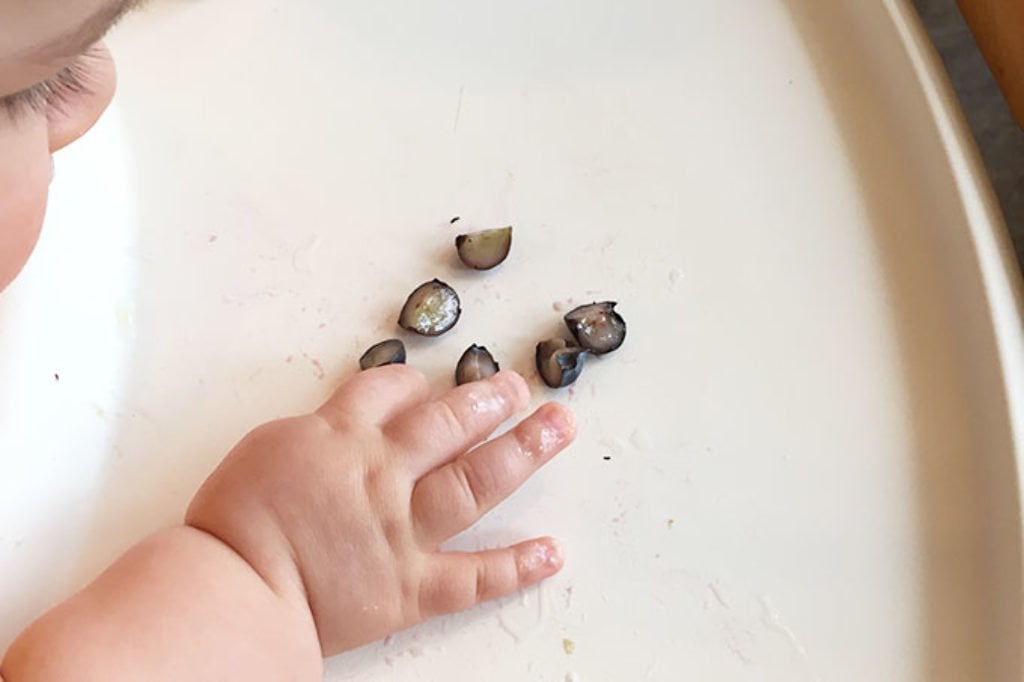
Your Toddler Wants ONLY Blueberries
You put out a bowl of blueberries (or another favorite food of the moment!) as a pre-dinner snack and your toddler eats them all and wants more. She wants more so badly that she turns into a sobbing mess. There literally aren’t any more blueberries in the house and you try your hardest to get her to understand you. She doesn’t and refuses to eat dinner.
Reality Check: Toddlers feel many things very intensely and this goes for their food preferences, too. And the concept of running out of foods is still a little fuzzy to them, so in their mind, they simply want more and you aren’t giving it to them. It’s upsetting!
Your toddler is not crazy for losing her mind. She is tired at the end of the day and is disappointed. She will not waste away if she skips dinner. She won’t grow up to be unable to control her emotions as an adult. She’ll go to bed, sleep well, and likely be super hungry for breakfast the next day. And she might even consent to eat something other than blueberries! (This should improve as they get older.)
Even though this can seem crazy to us, this reaction is actually very developmentally normal for little kids.
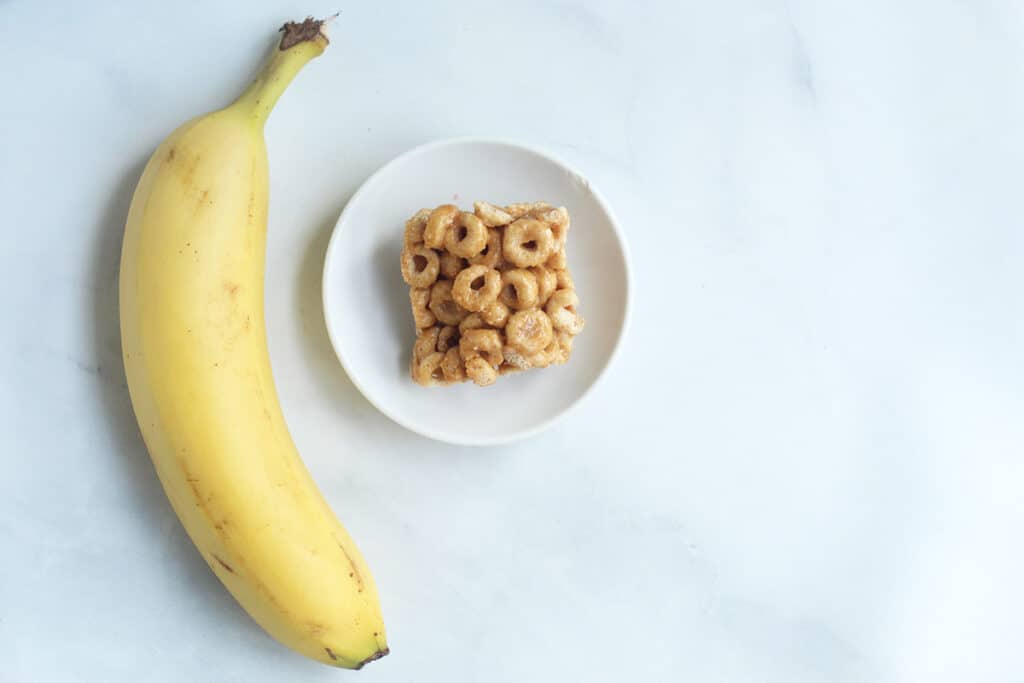
A Toddler Eats Only Three Foods
Your toddler eats only mac and cheese, yellow cheese, Cheerios, and bananas, and you’re losing your mind because you can’t get her to eat anything else. Won’t she be malnourished without eating a wider range of foods!?!?
Reality Check: It can often feel like our kids don’t eat anything other than a few things. I challenge you to keep a running list of everything they eat over the course of a week, not simply a day. You might be surprised to see the list get longer than you expect. (And, hey, your toddler does eat mac and cheese, yellow cheese, Cheerios, and bananas, which is something!) But if you do find your toddler is relying on favorite foods at most meals, try these simple tips to encourage trying new foods.
And always continue to offer a range of food in addition to these favorite foods to make sure you’re exposing the child to other foods. Serve them in small portions and make sure they taste good to you. Hopefully your child will eventually become less fearful of these other foods and will taste them—as long as dinner doesn’t turn into too big of a power struggle—so do your best to stay neutral about what they eat and not push too hard.
TIP: Read more about the Division of Responsibility in Feeding here, which will give you a helpful framework for serving kids food.
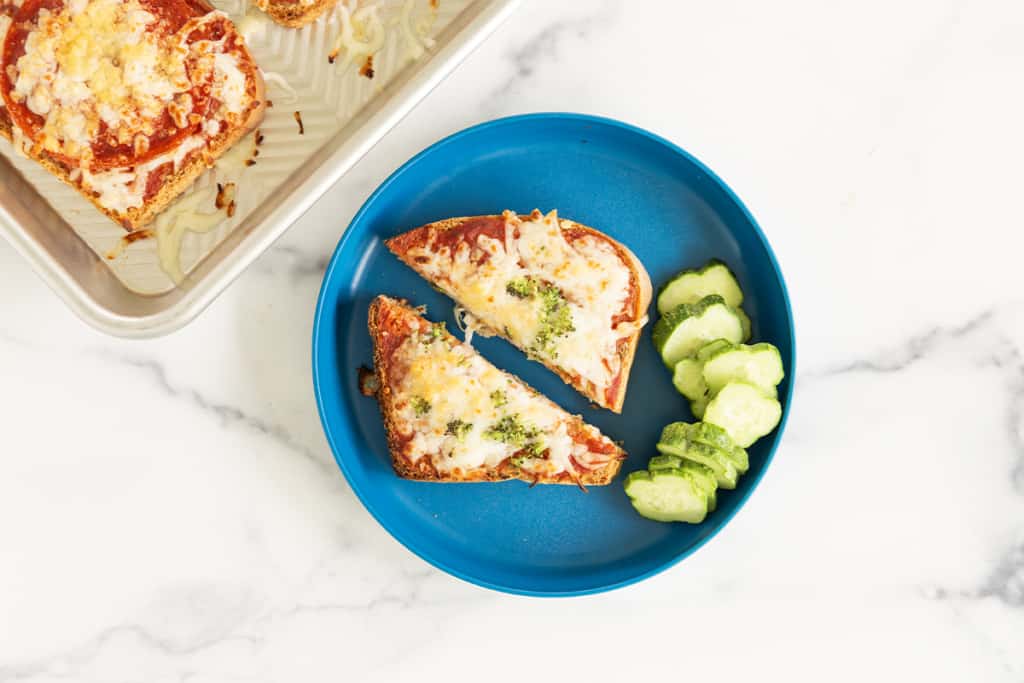
Toddler Refuses Dinner … But Wants All the Snacks
Dinner is often refused, but your toddler routinely asks for a snack when it’s time for bed. You usually give it to him because you don’t want him to go to bed hungry, yet you hate that he’s turned into such a picky eater!
Reality Check: Kids are smart and if they know they can hold out for preferred snack foods instead of eating dinner, and buy themselves a bit longer before bedtime, they will do it! So you need to decide on a plan.
Here are some options: Make a bedtime snack a regular thing and choose foods that aren’t too exciting (fruit, cheese, plain cereal). Or, take food after dinner off the table as an option by explaining that the kitchen is closed after dinner, there will be no snack, and if you don’t eat your dinner, you can be hungry for breakfast. Or, incorporate more “snack” foods into meals and more “meal” foods into snacks. This can help take those snack-type foods off of a pedestal and normalize them a little more.
TIP: If your toddler isn’t eating, learn what’s normal and what’s not.

Toddlers Don’t Eat the Range of Foods They Did as Babies … Why?
As toddlers grow out of babyhood, they become more aware of the world around them—and their power in it. Combined with that, they are usually growing less than they did as babies, so their hunger may simply be less than it was.
Reality Check: Toddlers love routine and in many circumstances, this is a great quality because it helps them to make sense of the world as they move throughout their day. But when it comes to food, routines can quickly turn into set-in-stone habits that are crazy hard to break. I always joke that if I do something twice with my oldest, I’ll have to do it every day for the rest of my life so keep that in mind with snacks and favorite foods.
Here are some tips to keep in mind for feeding kids:
- If a child doesn’t want to eat a food they used to like, it’s possible they just aren’t as hungry as you expect.
- Serve a smaller portion.
- Offer a funny utensil like a big fork, spoon, or mini tongs.
- Offer a dip or ask “how can I make this yummier?”
- Eat a range of foods in front of the kids.
- Offer to let them help you with some food prep so they are exposed to foods without the pressure to eat them.
TIP: One-year-olds grow less quickly than they did as babies, so your kiddo may hit 17 months and simply be less hungry than you expect. That is very, very normal.
Serve Foods You Want Your Kids to Eat
As much as possible, serve the foods you want your kids to eat and let them decide what of it to put into their mouths. They will not waste away if they don’t eat a good dinner every night. They will not have stunted growth if they never touch kale until after college. You are not a bad parent if you can’t get them to eat their broccoli!
And as with all things kid-related, remember this particular phase you’re in with feeding your little ones will soon pass (and if it doesn’t, the Division of Responsibility is still a great way to handle it) and they’ll be on to challenging you with the next thing. They will not live on cheese and crackers forever, I pinky swear. Stay calm, try not to take it personally, and remember: They’re just being toddlers!!
Remember Kids Are Still Learning
We continue to learn to eat as we grow over a long period of time, so it can help a lot to take some of the pressure off yourself that everyone needs to like every food right now.
The truth is we adults don’t like every food. And it’s OK if we all enjoy different things. Yes, we need to be able to feed our families without going crazy with effort, but a lot can change with the simple perspective shift.
When to Seek Medical Help
If you’re ever very stressed or worried, if your child is not gaining weight, growing, and meeting their milestones, if something about their overall health or demeanor seems off, or they are having serious texture aversions, please check in with your pediatrician. This post is not meant to be a substitute for medical advice.
Related Posts
This post was first published December 2018.


